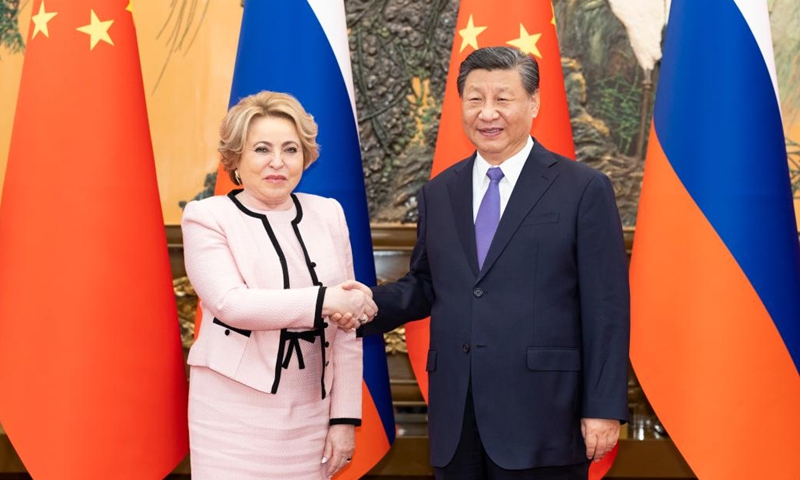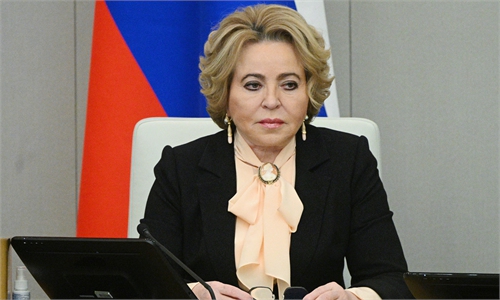Xi meets Russian Federation Council Speaker; frequent high-level exchanges signal strategic importance for China-Russia ties: experts

Chinese President Xi Jinping meets with visiting Russian Federation Council Speaker Valentina Matviyenko at the Great Hall of the People in Beijing, capital of China, July 10, 2023. Photo: Xinhua
Chinese President Xi Jinping met the visiting Russian Federation Council Speaker Valentina Matviyenko on Monday in Beijing, saying China is willing to continue working with Russia to develop a comprehensive strategic partnership of coordination for a new era and strengthen cooperation in multilateral groups such as the Shanghai Cooperation Organization (SCO) and the BRICS.
Chinese experts say the exchanges of the China-Russia committee for parliamentary cooperation demonstrate the continuity and stability of China-Russia relations, and some believe the recent frequent exchanges between China and Russia at various levels amid a complex global situation signal the strategic importance of the ties.
With joint efforts of both sides, China-Russia relations have maintained a sound and steady development momentum, with steady progress in cooperation in various fields. The social foundations and popular support for the long-term friendship between the two countries have become more solid, Xi told Matviyenko.
In March, Xi paid a state visit to Russia, and together with Russian President Putin, the two leaders reached new important consensus on deepening the comprehensive strategic partnership of coordination for the new era and practical cooperation in various fields between the two countries.
Developing China-Russia relations is a strategic choice made by both countries based on their own national and people's fundamental interests, Xi said. China is willing to continue to work with Russia to develop a comprehensive strategic partnership of coordination for a new era that is mutually supportive, deeply integrated, pioneering and innovative, and mutually beneficial, to help rejuvenate the two countries and promote a prosperous, stable, fair and just world.
Matviyenko and her delegation are visiting China from Sunday to Wednesday and attend the eighth meeting of the China-Russia committee for parliamentary cooperation.
The mechanism for inter-parliamentary exchanges between China and Russia has been there for a long time, which shows that the two countries are firmly moving toward the direction of consolidating bilateral relations against the backdrop of the increasingly complicated international landscape, Zhang Hong, an associate research fellow at the Institute of Russian, Eastern European and Central Asian Studies of the Chinese Academy of Social Sciences, told the Global Times on Monday.
Under the special circumstances and conflicts, the China-Russia ties are not affected, showcasing the development of the bilateral relations is guaranteed, Zhang noted.
During the meeting on Monday, Xi emphasized that legislative cooperation is an important part of China-Russia relations. Both sides should strengthen the exchange of legislative and governance experience, and promote new levels of cooperation between the two countries' legislative bodies.
Xi also said the two sides need to strengthen communication and collaboration within multilateral groups such as the SCO and BRICS, guiding the correct direction of global governance reform and protecting the common interests of emerging market countries and developing countries.
Matviyenko said the comprehensive strategic partnership of coordination between Russia and China aligns with the interests and will of the people of both countries, and it has reached the highest level in history and continues to develop steadily.
The successful state visit by President Xi to Russia in March this year injected strong momentum for further development of the Russia-China relations. The Russian Parliament widely supports deepening cooperation with China and is willing to further strengthen dialogue and exchange with China's National People's Congress, to provide legal protection for the implementation of the consensus reached by the heads of the two states, the Russian politician said.
From what Xi said during his meeting with Matviyenko, the expert believes this has again revealed that the Chinese president attaches great importance to the development of ties with Russia.
Following Xi's visit to Russia, Russian Prime Minister Mikhail Mishustin paid an official visit to China from May 23 to 24. About a month later, Russian Deputy Foreign Minister Andrei Rudenko visited China, and had talks with Chinese State Councilor and Foreign Minister Qin Gang and Vice Foreign Minister Ma Zhaoxu on bilateral relations, the Ukraine crisis and other international and regional issues of common concern.
"China and Russia need to maintain high-quality communication, especially regarding the West and the US' attitudes and actions concerning the Russia-Ukraine conflict and toward China," Cui Heng, a lecturer at China-Shanghai Cooperation Organization training base for international judicial exchanges and cooperation, told the Global Times on Monday.
Maintaining open communication channels is vital to sustaining the strategic partnership between China and Russia, Cui noted. "Meanwhile, the visit of Russian officials to China also lays the groundwork for higher level visit." Xi has invited Putin to China this year for the third Belt and Road Forum for international Cooperation, according to media reports.
Matviyenko has been put on the sanction list by the US over the Ukraine crisis. A warm welcome in China also showed that China holds a distinct position different from the US-led West, some Chinese experts said.
While some Western media outlets and forces are over-interpreting the China-Russia interactions and hyping the so-called "China-Russia alliance," Zhang stressed that the two neighbors are non-aligned, not targeting a third party. An alliance will only put the diplomacy of the two sides into a passive bondage, and non-alignment also with the comprehensive strategic partnership of coordination in the new era is the best choice for both sides.
The expert also said the partnership is a good example of major-country relations, noting that opposing bloc politics and supporting multilateralism is also in line with China's long-term strategy.
Both China and Russia have similar views on global and regional affairs, that is, they support multilateralism and the establishment of a sustainable and comprehensive security concept, oppose hegemonism and unilateralism, he said.



